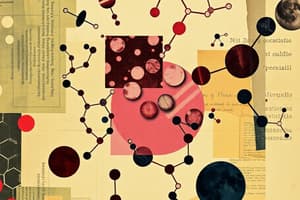Podcast
Questions and Answers
What is the effect of adding copper acetate to both T1 and T2?
What is the effect of adding copper acetate to both T1 and T2?
A blue precipitate forms in the lower aqueous layer of the saturated fatty acid, and the upper aqueous layer of the unsaturated fatty acid has a green color.
What occurs when concentrated hydrochloric acid is added to soap solution?
What occurs when concentrated hydrochloric acid is added to soap solution?
Drops of liberated fatty acids float on the surface of the water or form an emulsion.
What is the result of adding calcium chloride to soap solution?
What is the result of adding calcium chloride to soap solution?
A white precipitate of calcium soap forms at the bottom of the tube.
Why does soap float on the surface of the solution when NaCl crystals are added?
Why does soap float on the surface of the solution when NaCl crystals are added?
What is the reaction when glycerol is heated with acidic potassium sulfate?
What is the reaction when glycerol is heated with acidic potassium sulfate?
What is the role of potassium sulfate in the Acrolein test?
What is the role of potassium sulfate in the Acrolein test?
What is the difference between saturated and unsaturated fatty acids in the presence of copper acetate?
What is the difference between saturated and unsaturated fatty acids in the presence of copper acetate?
What is the equation for the decomposition of soap?
What is the equation for the decomposition of soap?
What is the equation for the precipitation of soap?
What is the equation for the precipitation of soap?
What is the purpose of the Acrolein test?
What is the purpose of the Acrolein test?
Flashcards are hidden until you start studying
Study Notes
Lipids
- Lipids are broad, non-polar organic chemical compounds with a greasy texture, poorly soluble in water, but soluble in organic solvents.
- Lipids consist of carbon, hydrogen, and oxygen, and have plant and animal sources.
- Functions of lipids:
- Long-term energy reserve
- Important in cell structure
- Acts as a thermal insulator for the body
- Acts as hormones
Composition of Lipids
- Lipids consist of a combination of one glycerol molecule with three fatty acids.
- Glycerol is a trihydroxy alcohol considered the basis for the formation of fats.
- Each glycerol molecule is linked to three fatty acids, forming esters, fats, or oils.
Classification of Fatty Acids
- Saturated fatty acids:
- Have a long, continuous, unbranched hydrocarbon chain with single C-C bonds.
- Contain 16 or 18 carbon atoms.
- Are insoluble in water, but soluble in organic solvents.
- Are solid at room temperature.
- Unsaturated fatty acids:
- Contain one or more double bonds, C=C.
- Are insoluble in water.
- Are necessary for the body, as their deficiency leads to skin diseases and a deficiency in some oxidizing enzymes.
- Are usually liquid at room temperature.
Types of Lipids
- Simple fats:
- Result from the reaction of fatty acids with alcohols.
- Examples: fats and oils.
- Complex fats:
- Consist of the reaction of fatty acids and any type of alcohol, to which carbohydrates, phosphorus, protein, and phosphorus are added.
- Examples: phospholipids.
- Derived lipids:
- Derived from simple and complex fats through the process of hydrolysis.
- Examples: cholesterol.
Lipid Detection
- Distinguish between saturated and unsaturated fatty acids using copper acetate.
- Copper acetate reacts with saturated fatty acids to form copper salts (copper soap) in the form of a bluish-green precipitate.
- Copper acetate reacts with unsaturated fatty acids to form green copper salts.
Separation, Precipitation, and Decomposition of Soap
- Decomposition of soap using hydrochloric acid (HCl) to liberate fatty acids.
- Precipitation of soap using calcium chloride (CaCl2) to form insoluble calcium soap.
- Separation of soap from solution using sodium chloride (NaCl) to cause the soap to float on the surface of the solution.
Studying That Suits You
Use AI to generate personalized quizzes and flashcards to suit your learning preferences.




